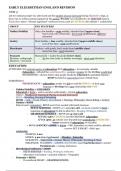EARLY ELIZABETHAN ENGLAND REVISION
UNIT 3:
Life for ordinary people was often hard and the number of poor increased during Elizabeth’s reign, as
there was no welfare system/support for the poorer. Poverty was considered to be ‘your own’ fault in
Elizabethan times: “divinely appointed” reinforced every week at CHURCH; this attitude = widely held.
GROUP KEY FEATURES
Nobles/Nobility Only a few families = very wealthy, inherited land [upper class]
- Don’t work, lots of free time - don’t need qualifications, different
education
Gentry Most families = less wealthy, inherited land [upper middle class]
- Lots of free time - need qualifications
Merchants Traders = sells goods, don’t make them [middle class]
- Some free time - need education
Peasants Manual jobs = makes the goods [lower class]
[Yeomen, craftspeople, - No free time [only on Sunday mornings] - don’t need education
labourers / servants]
EDUCATION:
ATTITUDES: NO national system of education BUT education = increasingly valuable
Education - reflected the social hierarchy = purpose: prepare for the life they would lead
HUMANISTS = did not believe that people should be educated for practical reasons =
STOP the belief in superstition [move AWAY from
Catholicism]
PROTESTANTS = education: people are able to read the BIBLE + in their own
language to develop their own relationship with GOD
- Nobles/Nobility = CHILDREN
Educated at home + sent to another noble family = finnish education
GIRLS = Needlework, Dancing & Playing a musical instrument
BOYS = Wrestling, Fencing & Swimming
BOTH = Latin + Greek, History, Government + Theology, Philosophy, Horse Riding + Archery
- Gentry = SONS
School wasn’t compulsory, BOYS went if not needed with family business
- PETTY SCHOOLS = BOYS up to 10 years old - set up in a teacher’s home =
beginning of education [if able to afford it] = Reading, Writing & Arithmetic
- GRAMMAR SCHOOLS = BOYS 10-14 years old
BEFORE 1560: CHURCH provided MINIMAL education
AFTER 1560: 42 schools were founded [not controlled by CHURCH] =
better standard of education AVAILABLE
= BOYS [GENTRY’s SONS] in towns = FEE: dependent on what could be afforded
= poorer BUT if SMART - didn’t pay:
scholarship
STARTED: 6 am
ENDED: 4 pm [lasted 10 hours] = Monday - Saturday
SUBJECTS = Latin Greek + French, History, Philosophy, Wrestling & Chess
DISCIPLINE: IN LESSON = 2 BOYS: MONITORS, report bad behaviour to teacher
Punishments = Caning, Exclusions
- Merchants/Craftsmen = SONS
- PETTY SCHOOLS = Reading, Writing & Arithmetic
- Alternative Curriculum = practical subjects + Geography
- Peasants = SONS
- If considered SMART = GRAMMAR SCHOOL
, - MOST: complete apprenticeships [practical work/skills for job] - no formal education =
taught by their families, at home/by working on land
- GIRLS
Girls of ALL classes did not often go to school, if they did they attended:
- DAME SCHOOLS = fewer hours = less educated = Reading, Writing & Arithmetic
- EDUCATION AT HOME
- Needlework
- Cooking
- Making herbal remedies
- Midwife
IMPACT OF EDUCATION:
Literacy = BOYS: increased by 10% = CHURCH no longer in control
& INCREASE no. of GRAMMAR SCHOOLS
GIRLS: NO CHANGE - no improvement = didn’t NEED education
● UNIVERSITIES [Oxford & Cambridge]
Age: 14/15 year olds (short life expectancy)
Curriculum: Medicine, Philosophy, LAW, Music, Astronomy, Divinity [RELIGION]
LAW = Inns of Court: 3rd UNIVERSITY for LAWYERS
LEISURE:
NOBILITY & GENTRY [NOT PEASANTS] Hunting - catch animals [men&women] P:
illegal
Hawking - hunting with a hawk [men&women]
Fishing [men&women]
Fencing - practice sword fighting - men
Tennis - real, indoor with courts - men
NOBILITY, GENTRY & PEASANTS - MEN Wrestling - public matches
Swimming
Gambling on blood sports
Football = only men: played on streets
ALL CLASSES - MEN&WOMEN Blood sports:
- Bear/Bull baiting = watching animals
fight to death
- Cock fighting = cockerels attacked each
other using metal spurs and their beaks -
special ARENAS were also built
Gambling was placed on these
fights
Literature - printing press, exploration: DRAKE
Theatre
- Circular with tiered seating:
The Pit = cheap - peasants
Covered seats = expensive -
nobility
- Theatre companies = funded by nobility
Elizabeth’s men: actors
- Plays = secular/not religious
= CHURCH is powerless
= PURITANS: believed theatre was the work of
the devil - spread of lewd ideas, encouraging
moral behaviour & associated with ROMANS
[persecuted CHRISTIANS]
Music - upper class = expensive, at home
lower class = bagpipes/fiddle, at fairs
Dancing = ALL - brought together
men&women HOWEVER, upper and lower
classes did NOT dance together





